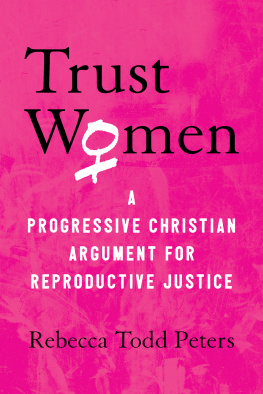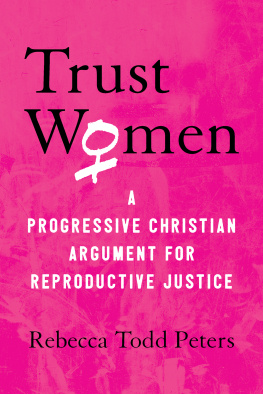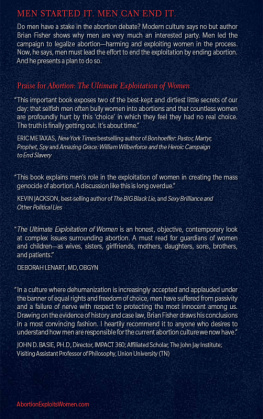Contents
Pagebreaks of the print version
Guide

To my mother, Becky,
whose moral wisdom continues to guide me
To my husband, Jeff,
whose love and friendship sustains and holds me
To our daughters, Sophie and Eve,
who inspire me to continue to fight for social justice
and
In memory of Beverly Wildung Harrison,
who taught me how to be a social ethicist
INTRODUCTION
On a hot and humid August evening, I trail down the aisle at the local drugstore looking for pregnancy tests. Im twenty-six and married, but Im still embarrassed and I glance around to see if anyone is looking, like a teenage girl buying condoms and trying to pretend she isnt. I do not want to be pregnant; I do not want anyone to see me with a pregnancy test. There are several tests to choose from, and I have no idea how they differ from one another. Out in the parking lot, I climb into the car, where my husband is waiting, and we head home. The tension in the car is palpable. After we get home, he tries to persuade me to eat dinner before I take the test, but I need to know now. I go into the bathroom, read the directions, and pee on the little white stick. Urine splashes everywhere. I lay the stick on the sink while I clean up the toilet and wash my hands. I watch as the plus sign emerges and darkens with each passing second. I stare at it intently, willing it to turn back. Maybe the horizontal line that transforms the test into a plus sign is supposed to surge like this right before it disappears. It doesnt. I am devastated. Utterly and completely. I do not want to be pregnant. I do not want a baby. Though I have only been married for nine months, I can feel my marriage falling apart around me. I love my husband, but I do not know what is happening between us. Every day, I wonder if we are going to weather this storm. All I know is that there is barely room for the two of us in this relationship, never mind three. Weve only lived here a month. I dont even have a doctor. The next day, my husband finds an ob-gyn who does abortions in her office and I make an appointment. After the procedure, I lay in our bed and cry. I cry because I am scared that my marriage is ending. I cry because I had wanted to have children with this man, just not right now. I cry because sometimes you just need to cry. One week after the abortion, my husband and I separate. This is my first abortion experience. I have never regretted it.
I AM A CRADLE CHRISTIAN and an ordained Presbyterian minister. I did not choose to end my pregnancies despite my Christian identity and faith but rather because of it. My faith is not a tangential part of my life; it is a defining feature of my identity and my work as a feminist social ethicist. Like many women, I make reproductive decisions that align with my values. Decisions that reflect and respect the commitments I have made to my marriage, to being a good parent, and to my moral obligation to love myself.
Every year in the United States, 6.4 million women get pregnant, and half of these pregnancies are unplanned. With my first pregnancy, I joined their ranks. Like me, 50 to 60 percent of the women who have abortions were using birth control during the month that they got pregnant. Whether planned, unplanned, chosen, avoided, or unattainable, pregnancies are part of the stories of womens lives. Yet, considering that one in three women have abortions, we can see that abortion is also a normal part of womens reproductive lives.
Despite the normalcy of abortion, we live in a culture that largely assumes abortion is wrong. Certainly, not everyone believes it is wrong, but the assumption that abortion is wrong frames both the contemporary abortion debate and how our culture responds to and discusses the issue. This moral judgment is evident in recent legislation that interferes with womens access to abortion or seeks to persuade women to continue their pregnancies. It is evident in the increased policing and incarceration of women who seek to end their pregnancies. It is evident in the culture of shame that deters the majority of women from telling others they are having or have had an abortion. It is evident in every statehouse and public hearing across the country where the moral character of every woman who has had an abortion is put on trial. These women are denounced for being selfish, careless, or irresponsible; for killing their children; and for other moral infractions against idealized versions of femininity and motherhood.
Even people who are pro-choice often go out of their way to clarify that they are not pro-abortion (heaven forbid!) but that abortion should be legal as a matter of public health. Since Bill Clinton first introduced the idea that abortion should be safe, legal, and rare, the idea has become a favorite pro-choice rallying cry of politicians. By focusing on making abortion rare, they seek to appease a public uncomfortable with any attitude that challenges the consensus that abortion is morally wrong. This stance is not surprising given that the theoretical framework that shapes how we think and talk about abortion requires women to justify why they are having an abortion.
I do not want to have a baby is the logical reason most women seek an abortion, yet it is not considered adequate. Women are required to have good reasons, acceptable reasons, reasons that outweigh or override the prevailing moral injunction against abortion. Requiring women to justify why they seek to end a pregnancy assumes that abortion is wrong unless one is able to make a convincing argument otherwise. But what are the origins of this supposed moral injunction? Why do so many people assume that abortion is morally wrong? Society hasnt always assumed that abortion was wrong. As we will see, abortion was actually a common form of birth control through much of the nineteenth century. Even today, there are many people who do not consider abortion immoral. So, in a country where abortion is legal and women do not have to explain to their healthcare providers why they wish to end a pregnancy, why does our cultural debate continue to judge and shame women for having abortions?
JUSTIFICATION FRAMEWORK
There is an unexamined pronatalist bias in this country. An attitude that reflects deep, often unspoken patriarchal assumptions about women and womens sexual activity. Consider these examples:
Responsible women dont have unplanned or unwanted pregnancies.
Women who have abortions are sexually promiscuous.
Women who get pregnant have to live with the consequences of their behavior.
If you dont want to have a baby, you shouldnt have sex.
These assumptions are at the heart of what I call the justification paradigm that frames the contemporary conversation about abortion in the United States. In this framework, when women get pregnant, we expect them to have babies. Abortion disrupts this narrative. Consequently, women are required to offer socially acceptable reasons for ending their pregnancies. In short, they must justify their moral decision. The necessity of justification permeates the very language of the debate itselfpro-choice arguments seek to justify womens right to abortion, while pro-life arguments seek to limit and even eliminate acceptable justifications.
In fact, the public has developed rather rigid perceptions about when abortion is morally acceptable and when it is not. Prenatal health, rape, incest, and life of the mother (PRIM) are accepted as justifiable reasons for abortion. Since 1972, some 87 percent of the US public has consistently approved of abortion when a womans health is endangered, 78 percent approved of it in circumstances of rape, and 77 percent in cases of serious prenatal health issues. These women are routinely caricatured as selfish, irresponsible, immature, or sexually immoralaccusations that show up not just in public debates and discussions of abortion, but also in church discussions about abortion. In fact, such characterizations dominate debates about abortion in many Christian denominations that support the continued legalization of abortion while explicitly rejecting abortion for convenience, birth control, or sex selection.






